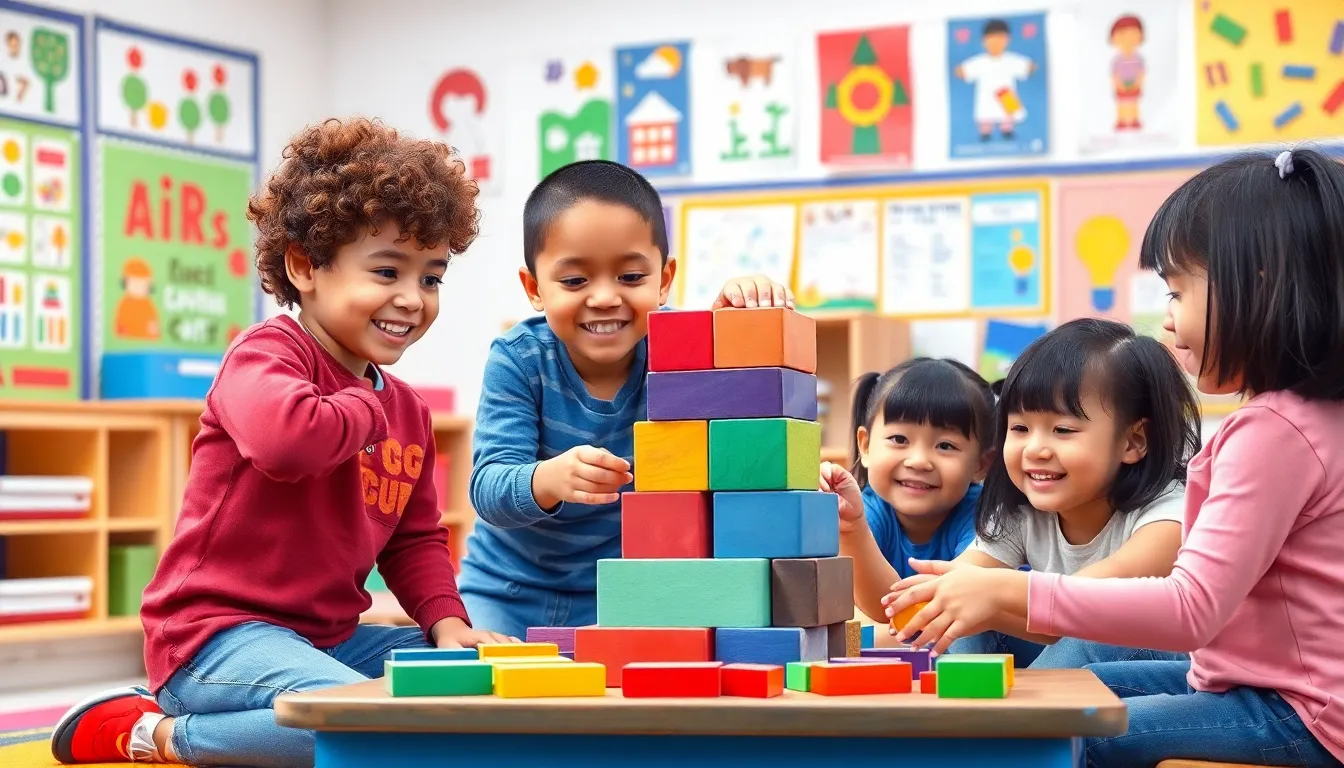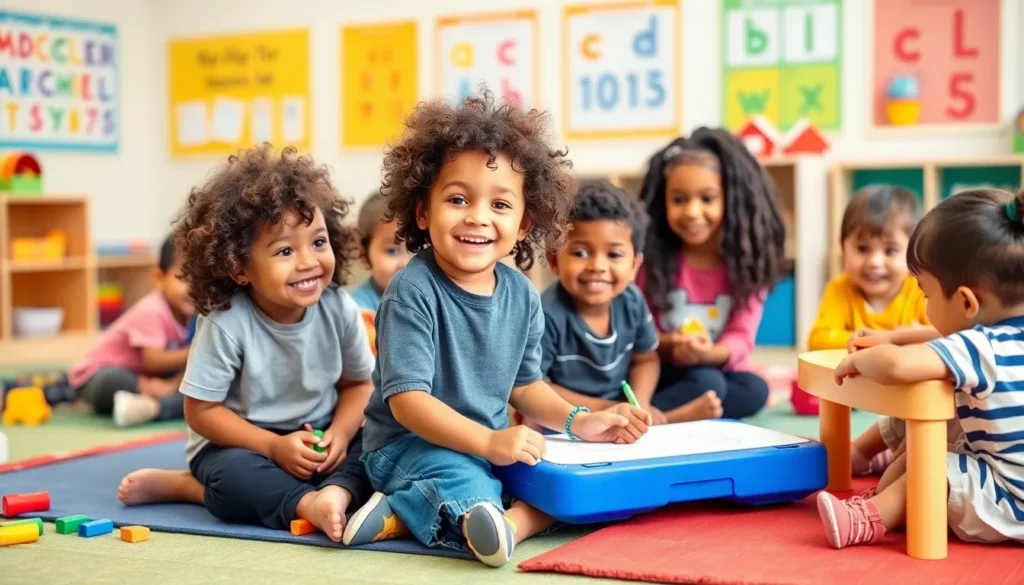Table of Contents
TogglePreschool isn’t just a place for kids to color outside the lines and perfect their snack-eating skills. It’s the launchpad for their future success. Imagine a world where your little one learns to share, follow directions, and even master the art of the nap—all while making friends and having fun. Sounds like a win-win, right?
Importance of Preschool
Preschool serves as a critical foundation for lifelong learning and development. Children engage in structured play, fostering creativity and imagination. They develop essential social skills, including sharing and cooperation, during group activities. Instruction in basic concepts like numbers and letters occurs alongside these interactions, making learning enjoyable.
Academic achievement correlates strongly with preschool attendance. Research indicates that children who attend preschool are more prepared for elementary school, showing better outcomes in literacy and mathematics. Child development experts have found that early educational experiences positively affect cognitive and emotional growth.
Socialization is another key benefit of preschool. Young learners make friends, practice communication skills, and learn how to resolve conflicts. This environment nurtures their emotional intelligence, equipping them with tools to navigate future relationships.
Teacher-guided activities enhance critical thinking. By participating in problem-solving tasks, children explore different perspectives. Engagement in various subjects like art, music, and science broadens their horizons and piques their curiosity.
Preschool also prepares children for transitions. Entering elementary school can be daunting, but those who’ve attended preschool adapt more easily. Familiarity with routines and classroom dynamics provides reassurance and confidence.
Life skills gain focus during the preschool years. Tasks like dressing independently or organizing their belongings instill a sense of responsibility. Children become more self-sufficient, promoting independence that continues into later educational stages.
Ultimately, preschool lays the groundwork for a successful future. The benefits extend beyond immediate academic readiness, influencing overall well-being and lifelong learning attitudes. Prioritizing early childhood education ensures children have the tools they need to thrive as they progress through life.
Child Development Benefits

Preschool plays a crucial role in a child’s development. Children experience various cognitive and social advancements during these formative years.
Cognitive Development
Exposure to structured learning environments enhances cognitive growth. Children engage in activities that develop problem-solving and critical thinking skills. They learn to recognize letters and numbers through interactive lessons, paving the way for future academic success. Initiatives like music and art stimulate creativity. Evidence shows that early learning experiences contribute significantly to long-term academic achievement. Research indicates that preschool attendees exhibit stronger literacy and mathematical skills when entering elementary school. Intellectual curiosity blossoms as children explore new concepts and ideas.
Social Skills Improvement
Socialization occurs naturally in preschool settings. Children interact with peers, developing essential communication skills. Making friends and participating in group activities fosters teamwork and collaboration. Conflict resolution becomes a vital skill, with children learning to navigate disagreements. Emotional intelligence grows as they understand and express their feelings. Engaging in cooperative play teaches respect and empathy towards others. Benefits from these social interactions extend into later life, promoting healthier relationships and effective communication. By honing social skills early on, preschool prepares children for diverse social environments.
Long-Term Effects
Long-term effects of preschool experience significantly shape children’s futures. Key outcomes include enhanced academic achievement and improved emotional well-being.
Academic Achievement
Studies indicate preschool attendance correlates positively with academic performance. Research shows children exposed to structured learning environments demonstrate stronger literacy and mathematics skills. Engaging in creative activities helps foster curiosity and critical thinking. They enter elementary school better prepared, adapting smoothly to new academic challenges. Established foundations in subjects like reading and math support ongoing success throughout school years. Statistics reveal that children who attend preschool exceed their peers who do not, creating a clear pathway to future educational opportunities.
Emotional Wellbeing
Emotional intelligence develops significantly during preschool years. In nurturing environments, kids learn to identify and express their feelings. Social interactions foster communication skills and teach conflict resolution effectively. As a result, children build healthier relationships with peers, enhancing their overall emotional health. Participating in group activities helps them develop empathy and respect for others. Engaging in cooperative play nurtures emotional resilience, providing lasting benefits in stress management. Improved emotional well-being supports lifelong healthy relationships, influencing both personal and professional aspects of their lives.
Parental Involvement
Parental involvement significantly impacts children’s preschool success. Engaging actively with preschoolers enhances learning experiences.
Encouraging Participation
Fostering participation begins with parents showing interest in school activities. Attending events like parent-teacher meetings helps parents stay informed and engaged. Joining in on classroom activities allows parents to bond with their children while supporting their learning. Encouragement at home reinforces concepts learned at preschool, leading to deeper understanding. Moreover, discussing daily experiences nurtures verbal skills and builds confidence. Regular communication between parents and educators cultivates a collaborative approach, further benefiting preschoolers.
Building a Supportive Environment
Creating a supportive home environment is crucial for preschool development. Parents can establish routines that mirror preschool structures, promoting familiarity and comfort. Designating a specific area for learning activities encourages focus and cooperation. Ensuring access to educational resources, such as books and interactive games, supports cognitive growth. Parents should also model positive behaviors, fostering emotional intelligence and social skills. By nurturing compassion and respect at home, children learn essential values that extend into their interactions. Ultimately, this comprehensive support boosts children’s readiness for future educational endeavors.
Preschool is a vital stepping stone in a child’s development journey. It equips them with essential skills that lay the groundwork for future academic and social success. The experiences gained during these formative years foster creativity, critical thinking, and emotional intelligence.
Children learn to communicate effectively, resolve conflicts, and collaborate with peers, building a strong foundation for healthy relationships. The positive impact of preschool extends far beyond the classroom, influencing lifelong learning and well-being. Prioritizing early childhood education not only benefits individual children but also strengthens communities by nurturing capable and confident future generations.







